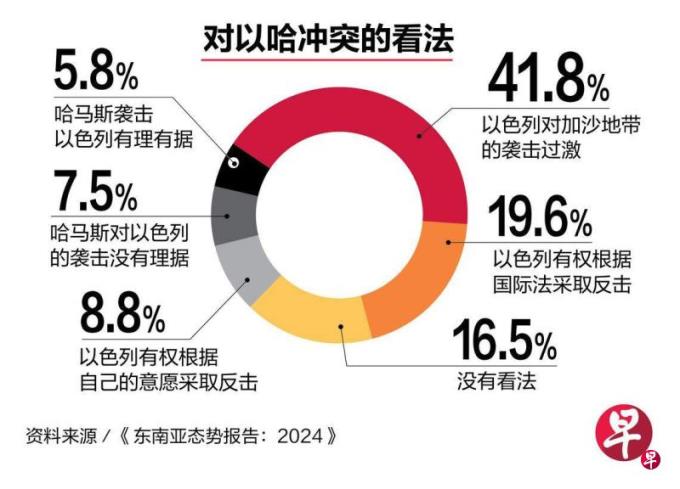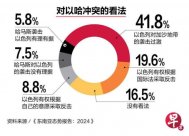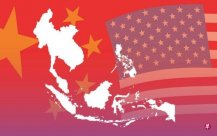
The conflict of Harbin conflict has not been extinguished. Among the many geopolitical challenges, the most watched by the people of Southeast Asian countries is worried that this conflict will drive extremist activities and impact regional security.Among them, up to 40 % of the respondents believed that Israel's attack in the Gaza Strip was overgraduate.
Although Israel and Gasha are far from Southeast Asia, in the Southeast Asian situation report: In 2024, as many as 46.5 % of the respondents expressed high attention to the Harbin conflict that broke out on October 7, even higher than the "home door door.The tension of the South China Sea.
Nearly 30 % (29.7 %) interviewees believe that this conflict will stimulate extremist activities in the region and impact domestic and regional security. 27.5 % worry that conflicts will weaken people's trust in international law and rules based on rules.
Professor Ke Chengxing, Dean of the School of Public Policy, Li Guangyao, analyzed the online press conference on Tuesday (April 2) in the report.Strict observance of it. "
The United Nations Security Council has just passed a resolution this month, demanding that the fire was immediately suspended, but it was obvious that Gaza's war was not broken.
Ke Chengxing said: "This will have a long -term impact on how the general public views the sacredness of international rule of law and how to maintain the rules -based order. This is fundamentally destructive in the fundamental sense."
Harbin conflict caused a bipolar response due to religious issues in many countries. Therefore, 17.5 % of the respondents participating in the investigation were worried that the conflict would weaken the social cohesion of their respective countries.The 15.4 % of the respondents worried that Ya Jian'an would not be united because of this.
Muslims accounted for 42 % of Southeast Asia.This largely affects the people's views on this conflict and also affect the positions adopted by governments of various countries.
Overall, 41.8 % of Southeast Asian interviewees believe that Israel's attack on the Gaza Strip is overly.In the Brunei (79.2 %), Indonesia (77.7 %) and Malaysia (64.4 %) in the Muslim population, the ratio of respondents holding this view is particularly high.
For their respective countries on the issue of Haha, 42.9%of the respondents agreed, indicating that 43.1%of neutrality and 14.1%opposed.Among them, Indonesia (78.1 %), Brunei (64.9 %), Malaysia (58.7 %) and Singapore (57.1 %) governments have received the most support for domestic people.
Nearly 70 % worry about the push price of Ukrainian war
Other geopolitical challenges attracted to the attention of Southeast Asian people are in order to attack the South China Sea (39.9 %), the Russian and Ukraine War (39.4 %) and global fraud (39.4 %).In comparison, the influence of Taiwan elections in 2024 was listed as a 7.6 % of the respondents who received concern.
At the Russian and Ukraine War, the concerns of the respondents were mainly reflected at the economic level.More than two of each of each (68.4 %) are worried that energy and food prices may rise and cause economic difficulties, which is 10.1 percentage points more than a year ago.
14.5 % of the respondents also pay attention to the trust of the Russian and Ukraine War weakening the international order based on rules and the violation of national sovereignty.Especially in Singapore, one of the four interviewees (25.6 %) expressed concern, accounting for the highest proportion among all Asian member states.The report believes that this reflects Singapore's position on the principle of international law on the issue of the Ukrainian war.




